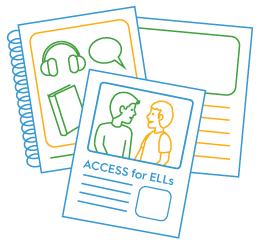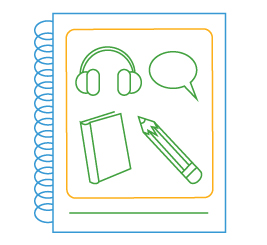Resources/Recursos
Featured Resources



All resources/Todos los recursos
Filter resources by:
Resources/Recursos
WIDA Screener Online Accommodations Checklist
A checklist for tracking the accommodations a student receives on WIDA Screener Online.
Resource Details View Download NowReleased June 2023
WIDA Screener Paper Accommodations Checklist
A checklist for tracking the accommodations a student receives on WIDA Screener Paper.
Resource Details View Download NowReleased June 2023
WIDA Screener for Kindergarten Accommodations Checklist
A checklist for tracking the accommodations a student receives on WIDA Screener for Kindergarten.
Resource Details View Download NowReleased June 2023
Kindergarten ACCESS Accommodations Checklist
Checklist for IEP teams to prepare for administering WIDA ACCESS for Kindergarten.
Resource Details View Download NowReleased June 2023
Rating Multilingual Learners' Written Language Consistently
This Focus Bulletin explores the process of evaluating student writing, and examines how educators can consistently evaluate the written language of multilingual learners. It provides strategies for educators to support evaluations that generate focused and helpful feedback for students.
Resource Details View Download NowReleased June 2023
Adopting a Language-Focused Approach to Play
This concept tool provides an overview for adopting a language-focused approach to play for multilingual children in PreK- third grade. This is the first of five resources intended to support PreK-3 educators to advocate for and incorporate joyful learning with multilingual children in their setting.
Resource Details View Download NowReleased June 2023
Language-Focused Planning Tool: Annotated Guide
What should PreK educators consider as they adopt a language-focused approach to planning equitable learning opportunities for multilingual children? Use this Annotated Guide to explore guiding questions designed to help you use the Language-Focused Planning Tool.
Resource Details View Download NowReleased June 2023
WIDA Guiding Principles of Early Language Development
The WIDA Guiding Principles of Early Language Development provide practitioners with a broad perspective on key concepts related to the language development of young children learning multiple languages. To further clarify the guiding principles, these research highlights provide practitioners with research-based descriptions and examples of effective practices.
Resource Details View Download NowReleased June 2023
Administrator Supplement: WIDA ELD Standards Framework Implementation Guide
The Administrator Supplement is a companion piece to the Implementation Guide. Whereas the Implementation Guide explores ways to apply the ELD Standards Framework into curriculum and instruction at the classroom level, this Administrator Supplement focuses on strategic and programmatic aspects of standards implementation. Its audiences are superintendents, principals, directors, coordinators, coaches and those with similar responsibilities and roles.
Resource Details View Download NowReleased June 2023
Implementation Guide: WIDA ELD Standards Framework
This guide offers practical ways to apply the ELD Standards Framework into curriculum and instruction at the classroom level. Its primary audiences are content and language teachers, specialists, coaches and instructional leaders. This guide is accompanied by the Administrator Supplement that focuses on programmatic aspects of standards implementation.
Resource Details View Download NowReleased June 2023
WIDA PreK-3 Essential Actions
This guide provides a set of actions PreK-3 educators, administrators and staff can take to support a language-focused approach to family and community engagement, and teaching and learning practices.
Resource Details View Download NowReleased June 2023
District Level Analysis of ELL Growth
This research project explored the patterns of district-level ELL “growth” for the 2007-2011 time period and identified the existence of “high-flying” and “low-cruising” districts within ACCESS for ELLs in terms of ELL growth.
Published May 2013
Author: Narek Sahakyan
Resource Details View Download Now
Released May 2023
WIDA Early Language Development Standards
The WIDA Early Language Development Standards, available for English and Spanish language development, are designed for use with children ages 2.5–5.5 years old and correspond to five domains of children’s development and learning: approaches to learning, language and communication development, cognition and general knowledge, physical well-being and motor development, and social and emotional development.
Resource Details View Download NowReleased April 2023
Alternate ACCESS: Entendiendo el puntaje de su niño
Envíe este volante a los hogares con los estudiantes, junto con el Informe individual del estudiante de Alternate ACCESS. Este folleto provee información sobre cada aspecto de la puntuación incluida en el informe. Utilice esta guía en español para ayudar a los padres a comprender qué significan las puntuaciones y cómo se utilizan.
Detalles del recurso Ver Descargar ahoraReleased April 2023
Examining English Learner Testing, Proficiency, and Growth: Before, During, and “After” the COVID-19 Pandemic
This report examines English learner testing, proficiency, and growth in the years surrounding the COVID-19 pandemic. This research builds on an October 2021 report on the impact of the pandemic, and includes data from the 2021-22 ACCESS for ELLs test administration. Findings indicate that in some grades and language domains EL's average proficiency and growth have returned to pre-pandemic levels. However, for most grades and language domains the evidence points to a continuing impact of COVID-19 on English learners’ English language development.
Published April 2023
Author: Narek Sahakyan, Glenn Poole
Released April 2023
Impact of ability range restriction on item characteristics in ACCESS multistage adaptive testing
This report describes how different student ability restrictions may affect item characteristics in the ACCESS multistage adaptive testing, and presents options for item administration in field testing.
Resource Details View Download NowReleased April 2023
ACCESS for ELLs Prueba de desempeño linguístico en inglés
Este informe brinda información sobre el nivel de desarrollo del alumno en la prueba de desempeño linguístico en inglés ACCESS for ELLs.
Detalles del recurso Ver Descargar ahoraReleased February 2023
Making Connections (Michigan)
Making Connections: Using the Michigan Early Learning and Development Standards and WIDA Early Years Resources to Plan Instruction for Young Multilingual Children is a comprehensive resource that offers suggestions, tools, and sample plans for teachers who use the Michigan Early Learning and Development Standards and WIDA resources to plan equitable learning opportunities for young multilingual children.
Resource Details View Download NowReleased February 2023
ACCESS for ELLs Interpretive Guide for Score Reports
This comprehensive document explains the types of scores reported by ACCESS for ELLs for students in kindergarten through grade 12.
Resource Details View Download NowReleased February 2023
Sample Alternate ACCESS Individual Student Report for Educators
This version of the report is for educators and provides information about a student’s scores on the Alternate ACCESS English language proficiency test. This test is based on the WIDA Alternate English Language Development Standards and is used to measure students’ progress in learning English. Scores are reported as Language Proficiency Levels and as Scale Scores.
Resource Details View Download NowReleased February 2023




